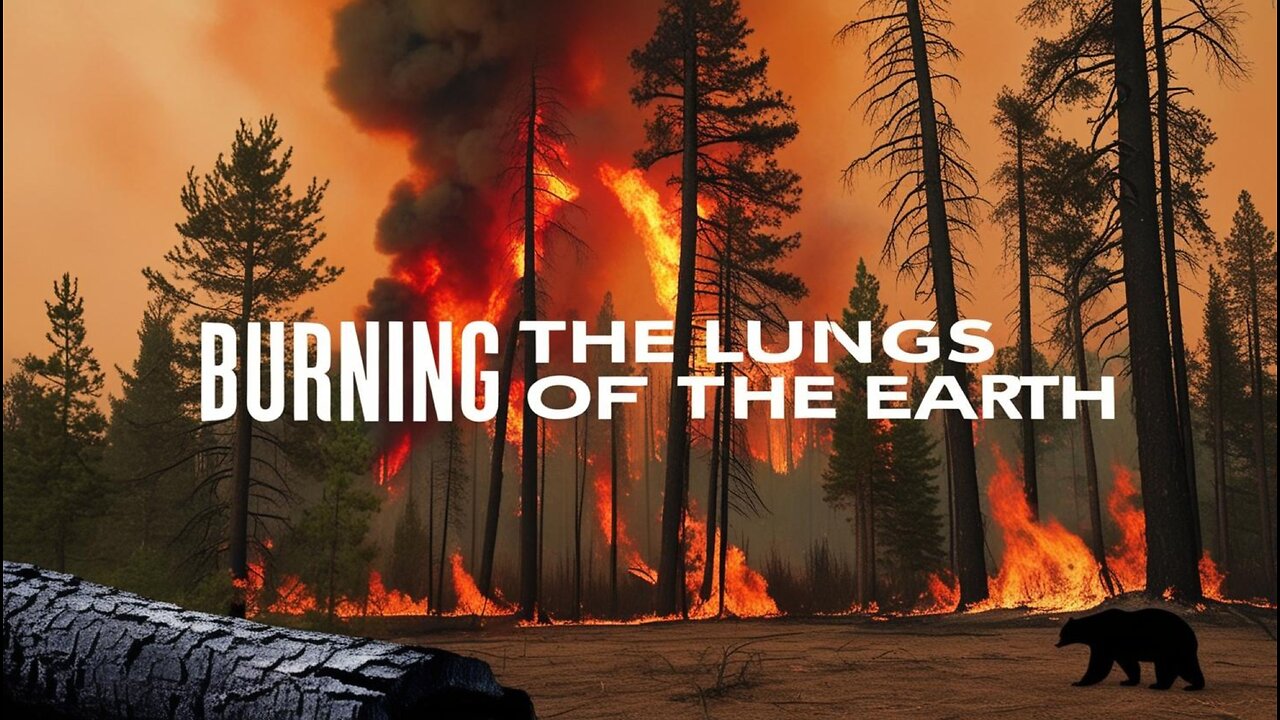Premium Only Content

Burning the Lungs of the Earth: The Boreal Forest and the Wildfire Crisis
The boreal forest is one of the largest and most important ecosystems on the planet. The boreal forest stretches across northern Canada, covering nearly 60% of the country’s land area. Its nickname the “lungs of the Earth” is due to its ability to absorb and store massive amounts of carbon dioxide. But this forest is more than just a carbon sink. The boreal provides essential habitat for these animals, supporting biodiversity at a scale few other places on Earth can match.
However, wildfires, fueled by climate change, are becoming more frequent and more intense. What was once a natural part of the forest’s lifecycle is now transforming into a crisis that could have long-lasting consequences. Certain species of trees, like jack pine and black spruce, actually rely on fire to regenerate. But now, with rising temperatures, prolonged droughts, and shifting weather patterns, the fires are growing bigger and faster, making them harder to control and far more destructive.
Over the past few decades, wildfires in Canada have burned millions of acres of forest. In 2023 alone, more than 13 million hectares were scorched. The wildfires were so destructive in fact that mass evacuations took place across the Northwest Territories. Summer of 2024, Jasper National Park, was completely evacuated. Back to back evacuations is not a coincidence, but a pattern. This increase in wildfire activity is directly linked to climate change, as warmer temperatures create drier conditions that make the forest more susceptible to ignition. It’s not too late to take action.
By protecting the boreal forest, investing in sustainable practices, and taking immediate steps to curb climate change, we can help safeguard this vital ecosystem for future generations.
. Adopt a Plant-Based Diet: Reducing or eliminating animal products lowers demand for factory farming, which is a major driver of deforestation, habitat destruction, animal cruelty and greenhouse gas emissions.
. Support Sustainable Brands and Companies: Choose products and services from companies that prioritize sustainability, ethical sourcing, reducing emissions, minimizing waste and animal welfare in their practices, such as those with certified Fair Trade, organic, or cruelty-free labels.
. Advocate for Wildlife Protection Laws: Support and raise awareness about policies that protect endangered species, regulate hunting, and safeguard critical habitats from destruction through legal means.
. Reduce Energy Consumption: Cut down on electricity and fuel use by investing in energy-efficient appliances, utilizing renewable energy sources, and adopting green practices like switching off lights when not in use and reducing car travel.
. Plant Trees and Support Reforestation Efforts: Trees are vital in the fight against climate change by absorbing carbon dioxide, protecting biodiversity, and supporting wildlife habitats. Participate in local tree-planting initiatives or donate to organizations focused on reforestation.
. Conserve Water: Freshwater is a limited resource, and conserving water helps maintain critical ecosystems and supports agricultural and wildlife needs. Use water-efficient fixtures, avoid wasting water, and support organizations that protect freshwater ecosystems and wetlands, which are vital for both wildlife and human communities.
. Educate and Raise Awareness: Spread knowledge about conservation, animal welfare, and environmental issues. Sharing information on social media or in your community can inspire others to take action.
. Reduce, Reuse, Recycle: Minimize waste by opting for reusable products, recycling materials, and choosing items with minimal packaging to reduce landfill waste and conserve natural resources.
. Volunteer for Conservation Projects: Donate time to wildlife rescue centers, local environmental groups, or global conservation organizations. Direct involvement in conservation efforts can have a meaningful impact on local ecosystems.
. Choose Eco-Friendly Travel: When possible, opt for sustainable travel options like walking, biking, or using public transport.
. Advocate for Climate Policy: Contact local representatives, vote for pro-environmental policies, and join climate advocacy groups.
. Support Sustainable Tourism: Travel responsibly by choosing eco-friendly tours and hotels that prioritize sustainability and wildlife protection.
. Support Wildlife Corridors: Advocate for and support the creation of wildlife corridors that help animals move safely through their habitats.
. Participate in Clean-Up Initiatives: Join local efforts to clean up beaches, rivers, or parks to remove trash that can harm wildlife.
. Adopt, Don’t Shop: Consider adopting rescue animals instead of buying from breeders or pet stores, helping reduce the demand for animal breeding and the number of animals in shelters.
-
 7:04
7:04
Brownells, Inc.
16 hours agoReloading Series: Converting Brass, Featuring 25 GPC
5K -
![[LIVE] Bully | GTA: Vice City | First Playthrough | 8 | Rampage and The Spirit of The Season](https://1a-1791.com/video/fwe1/85/s8/1/W/e/n/4/Wen4x.0kob-small-LIVE-Bully-GTA-Vice-City-Fi.jpg) 3:15:35
3:15:35
Joke65
10 hours ago[LIVE] Bully | GTA: Vice City | First Playthrough | 8 | Rampage and The Spirit of The Season
48.9K -
 3:27:04
3:27:04
Laura Loomer
12 hours agoEP103: Dems Promote Violent Anti-Trump Protests Nationwide
63.3K24 -
 6:50:08
6:50:08
Fairy Mysterious Adventures
10 hours agoStardew with the Rumble crew #16
52.9K2 -
 1:28:42
1:28:42
Kim Iversen
15 hours agoThe War on Terror Was a Scam? Is Osama Bin Laden Really Dead? SEAL Who Killed Him Breaks It Down.
89.3K164 -
 1:09:44
1:09:44
Slightly Offensive
12 hours ago $17.77 earnedALMOST SERIOUS: How Mass Legal Immigration DESTROYED Australia | Guest: Maria Zeee
90.7K35 -
 2:38:38
2:38:38
TimcastIRL
12 hours agoTrump Orders DOJ To FIRE EVERY Biden Attorney, Calls For CLEAN HOUSE w/Siaka Massaquoi | Timcast IRL
168K108 -
 1:29:31
1:29:31
Glenn Greenwald
15 hours agoGermany's Repressive Speech Crackdown Intensifies; U.S. & Russia Meet in Saudi Arabia and Open Cooperation; Plus: An Amazing Hate Crime in Florida is Buried | SYSTEM UPDATE #408
125K91 -
 1:30:48
1:30:48
Redacted News
16 hours agoBREAKING! TRUMP AND PUTIN NEARING PEACE BUT EUROPEAN WARMONGERS TRYING TO STOP IT | REDACTED
217K268 -
 52:40
52:40
Candace Show Podcast
16 hours agoSaturday Night Lively: What Were They Thinking? | Candace Ep 148
198K168